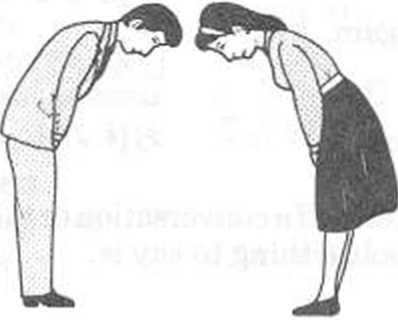PG010
■
Greetings & Civilities
Forms of Address
The Japanese equivalentof‘Mr’, ‘Mrs’, or‘Miss’ is san. It’san all-purpose polite suffix that should be added on to the family name. A person whose family name is Watanabe should be addressed as watanabe-san. The title sama serves the same purpose as san but is morę formal. Never refer to yourself or
anyone in your immediate family as ........ .san as this
address is reserved as a means of showing respect to others.
Most Japanese have a two-part name consisting of a family name and a given name. Traditionally, the family name precedes the given name in writing or speech, but, sińce many Japanese switch the order to accommodate foreigners, it is best to ask which is the family name if you are unsure. Do not address acąuaintances by their given names.
Very important words in Japanese are dózo (please) and arigató gozaimasu (thank you) - use them liberally. Dózo can be used in situations such as inviting someone to be seated or to enter a doorway before you. Arigató gozaimasu can be shortened to arigató and is often used in conjunction with dómo.
Attracting Someone's Attention
If you need to attract someone's attention, the Japanese equivalent of ‘excuse me’ is sumimasen. Before approaching someone for assistance of any kind it is polite to preface your question with this expression. In shops it is possible to cali for attention with gomen kudasai.
Greetings
There is no real all purpose word for ‘hello’ in Japanese. Rather the Japanese use a number of different expressions at different times of the day:
Good morning.
ohayó gozaimasu Good aftemoon.
konnichiwa Good evening. konbanwa
Hello (on the telephone) moshi moshi
Welcome
An important greeting you will hear when you enter Japanese homes, shops, restaurants, even lifts is irasshaimase (welcome). There is no need to respond.
Meeting People
When meeting for the first time, the Japanese have a number of expressions which correspond roughly to the English expressions ‘how do you do’ and ‘pleased to meet you’. The speaker accompanies his/her introduction with a
bo w.

Wyszukiwarka
Podobne podstrony:
PG025 Around TownAddresses Japan has traditionally used a district system of addresses. The hierarch
2) Oncc tho chlkl show* sufficiont confidencc and famillarity with lovol one of the gamo. then he or
Section 1: Describe the need and role of addressing in a network (5 ąuestions) 148
IMGx46 264 The Origin of Civilisation upwards on the ciuilisation gradient, and its unique status mu
IMGx48 268 The Origin of Civilisatiou Armed with the theoretical base we have now built, this concep
David C ?rhart ?rtain Victory, Images of World War II in the Japanese Media (2008) r Im ■ r rpr CE
PG056 112 NumbersMoney Japanese currency comes in yen and only yen; there is no Japanese equivalent
60119 IMGx31 234 The Origin of Civilisation Whetewer the detail of the actiwating mechanism, what ma
Mehta’s equivalence of the hijras’ behaviour with a theatrical performance is a revealing simile. Wh
THE THIRD WORLD 219 and civilizations, studying mainly the traditional and the new roots of the revo
SERVICE CARDAfter-sales seruice guarantee card MemberlD/username: Telephone: Address: The purchase o
1618 Rzeczpospolita Szlachecka?stionem zachodniej cywilizacji A.D. 1618 REPUBLIC OF POLAND THE BA
Professor M. Fukuoka I would now like to present the Honorary Membership of the Japanese Society of
więcej podobnych podstron